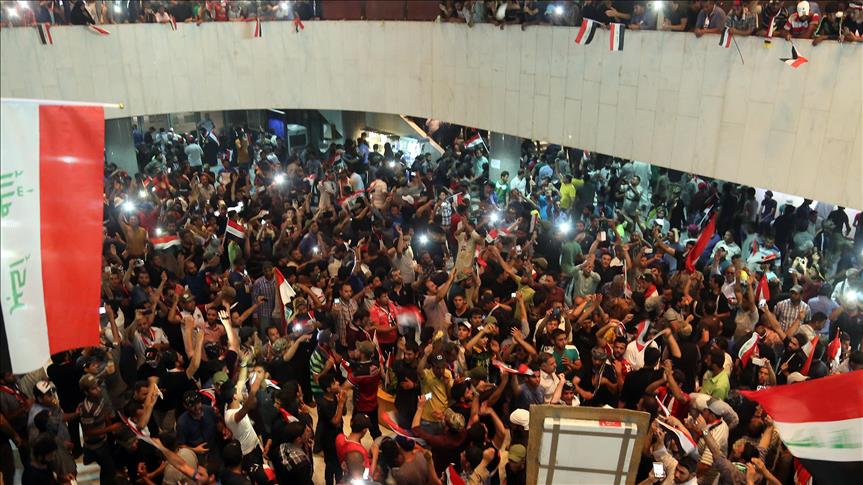US expert warns of conflict among Shia groups in Iraq
After storming of Iraqi parliament by al-Sadr supporters, ex-US envoy to Syria says situation may impact anti-Daesh fight
 Supporters of Shiite cleric Muqtada al-Sadr storm parliament in Baghdad's Green Zone on April 30, 2016. Thousands of protesters carrying Iraqi flags and chanting anti-government slogans broke into Baghdad's Green Zone and stormed the parliament building. ( Haydar Hadi - Anadolu Agency )
Supporters of Shiite cleric Muqtada al-Sadr storm parliament in Baghdad's Green Zone on April 30, 2016. Thousands of protesters carrying Iraqi flags and chanting anti-government slogans broke into Baghdad's Green Zone and stormed the parliament building. ( Haydar Hadi - Anadolu Agency )
Washington DC
By Kasim Ileri
WASHINGTON
The storming of the Iraqi parliament by supporters of Shia leader Muqtada al-Sadr has the potential to trigger an armed conflict among Shia groups, former U.S. envoy to Syria Robert Ford told Anadolu Agency Saturday.
“Certainly it means two things,” Ford said. “It means, number one, there can be more political and maybe armed conflict between different Iraqi Shia elements between Muqtada al-Sadr and Nour al Maliki-supported groups, and maybe between militias belonging to some of the Iranian-backed groups and Muqtada al-Sadr supporters.”
He added that al-Sadr was currently showing his strength, but it was not clear yet in whose favor the crisis would end up.
The veteran diplomat, who now works as a senior fellow at the Washington-based Middle East Institute, also noted former Iraqi Deputy Prime Minister Barhan Saleh’s tweet earlier in the day, saying that Saturday’s crisis was “the end of 2003 political system.”
Supporters of al-Sadr stormed Baghdad’s Green Zone Saturday forcing their way into the parliament building. They overran barriers set up around the heavily-fortified Green Zone, which houses a number of vital Iraqi state institutions and foreign diplomatic missions.
Speaking at a press conference in Najaf city, located some 160 kilometers (99.4 miles) south of Baghdad, al-Sadr voiced his rejection of what he described as "a political system that fails to take the popular will into account."
He also announced the suspension of activities of his "Ahrar" political bloc, which holds 34 seats in parliament, asserting that Ahrar MPs would refrain from participating in upcoming assembly sessions.
The Iraqi army has since responded by declaring a state of high alert in the capital and sealing all entrances into the city.
According to Ford, the current crisis would also have a significant impact on the war against Daesh.
“When all of these is happening in Baghdad, it of course must have an impact on the ability of the Iraqi national army to fight the Islamic State [Daesh] to date in Ninewah and in Anbar,” he said. “It will affect budgets, it will affect personnel rotations, soldiers and their officers who rotate in an out.”
He added that it would be impossible to imagine that this political fighting in Baghdad will not hurt the Iraqi effort against Daesh, which may “at least make it slower, impede it.”
Ford also predicted that Iraqi Defense Minister Khalid al-Obeidi and Iraqi Interior Minister Muhammed al-Ghabban, who are reportedly supporting Shia groups opposing Sadr may lose their seats at the end of the crisis.
Ambassador Ford served as the U.S. Ambassador to Syria from 2011 to 2014.
*AA Washington Correspondent Hakan Copur contributed to this report.
Anadolu Agency website contains only a portion of the news stories offered to subscribers in the AA News Broadcasting System (HAS), and in summarized form. Please contact us for subscription options.







